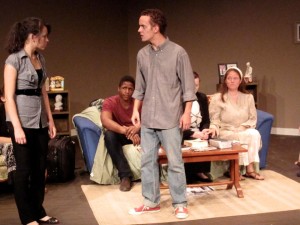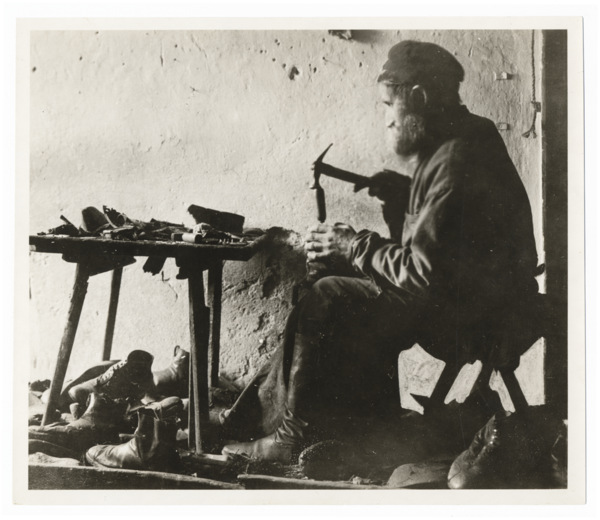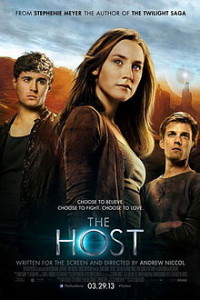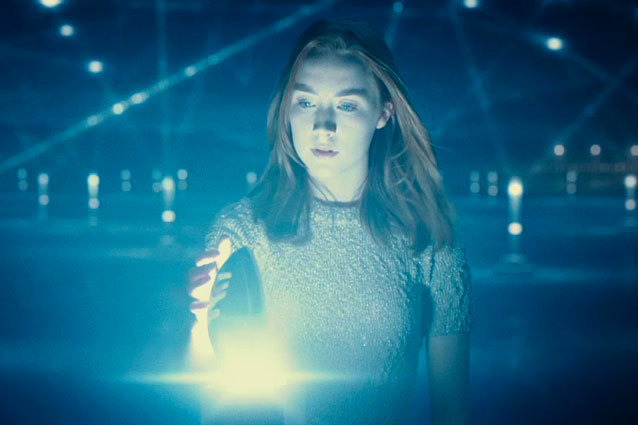
WARNING: Spoilers ahoy! If you want the context of the play referenced, A Roof Overhead, the majority of the production by ASU’s Binary Theatre Company was recorded and is up on You Tube. It’s not the highest quality recording, and it was a matinee (thus, historically, less audience engagement and laughing), but you get a good sense of that particular production. The Utah production, unfortunately, was not recorded due to technical difficulties (so not even I got to see it!). Of course, I think the issues the essay raises go beyond the actual play, so feel free to read it if you haven’t the time to watch an entire play at the moment.
James Goldberg’s award winning one act play “Prodigal Son” is a stirring play that flips Jesus’ proverb of the same name, showing the relationship between a former Mormon turned atheist and his son Daniel, who joins the faith his father had long since rejected. The tension and conflict caused by the reversal of the parental disapproval is both ironic and effective. Set in this gem of a play is a haunting monologue addressed to the audience by Daniel’s father:
We’re far too casual, I think, in the way we talk about losing. “I’ve lost my keys,” for example, really means you’ve mislaid them. We say we’re “lost” when we’re just disoriented. And we lose our tempers all the time, only to find them again a few minutes later—
I wish we wouldn’t dilute the best word we have for when things are truly and permanently gone. “Lost cause” is a good phrase. It’s a cold, hard dose of reality. No one goes out to find a lost cause. It’s just lost. That phrase understands the power of the word’s finality…
So when I tell you that a long time ago I lost my faith, I don’t want you imagine that I’ve misplaced or that I could be capable of finding it again. Lost faith is like a lost limb…if it’s broken and bleeding, if you try to patch it up and ends up being inflamed and infected…at some point you have to cut it off. And after you’ve lost it the only thing left is the occasional flash of phantom pain.
I lost my faith. Twenty years later I lost my wife. And now maybe I’m losing my son.
Don’t take away from me the only word I have to cope with that.[1]
Coming from a practicing Mormon like Goldberg, the monologue is unusually and beautifully sensitive towards this fictional father’s disbelief in God and religion. It shows a well of compassion and charity on Goldberg’s part towards what really amounts to a religious minority (at least in the United States and other predominately religious countries, although that trend is fast reversing in many places in the world). It’s an unexpectedly poignant moment in a beautiful play.
In this way, Goldberg has shown that he is particularly ready to clarify the way of the atheist to believers, and pleas for understanding on the his atheist friends behalf—perhaps even to the point of being a warm ambassador or a defensive patron when discussing atheism among believers. Thus it makes sense that, in his review of my play A Roof Overhead, he was quick to come to the defense of the doubter, even though such a vigorous and heated defense was hardly needed considering the context of the play’s intended message of tolerance and pleas for mutual understanding.
As Goldberg is not the only critic to misrepresent my representation of atheism, including a handful of antagonistic reviews written against my plays Swallow the Sun and Prometheus Unbound, I feel compelled to address the issue directly. I normally like my plays to stand on their own artistically, so that people may interact with them based on their own experiences and what they personally bring to the play, without constant and intrusive commentary from me.
However, some have tried to tie me to a pattern of intolerance towards atheists, even resorting to rather personal slights and warnings to others against my work. Thus, in the name of my reputation, I feel it best to clear up what my intent is, and what my intent decidedly isn’t, towards atheism and atheists. After all, if I’m to be lambasted on the matter, I would prefer to be lambasted for something I actually believe.



